
Subscribe to continue reading
Subscribe to get access to the rest of this post and other subscriber-only content.

Subscribe to get access to the rest of this post and other subscriber-only content.
Comments Off on The Lore of Inscrutable Dreams
Filed under entertainment, fairy tales, fantasy, myth, poetry, Publishing, Writing

Here in Canada, we’re a small but mighty population. We have many amazing writers, some quite famous, some not as well-known but equally amazing. We write to stave off boredom, the always encroaching cold of the north (remember the North!), wendigos, sasquatch and Ogopogo. And we write to explore and express new thoughts and worlds.
In our mighty little nation, (lots of land and the population of California) we have an active, widespread speculative community. There is written word, spoken word, podcasts, plays, music. Hawksley Workman is a musician who has clearly explored the mythic and speculative in his works (such as The God that Comes). There are numerous examples and I won’t wander down that path right now or I’ll get lost.
We also have the creator of the Just Joshing podcasts, Joshua Pantalleresco. He has spent quite a few years interviewing writers, actors and other artists and the full list of some 350 plus episodes are here. I met Josh many years ago at a local convention, When Words Collide, in Calgary. He was a veritable energizer bunny, full of enthusiasm, ideas and an inquisitive, friendly mind. Over the years we have come to know each other better and of course I’ve run into Josh interviewing this person or that for his podcasts. He even received an Aurora Award for Just Joshing. He interviewed me back when I was editing Alice Unbound. I like to think of him as Josh Pants to the Rescue, and he would have been a great sidekick for Captain Underpants.
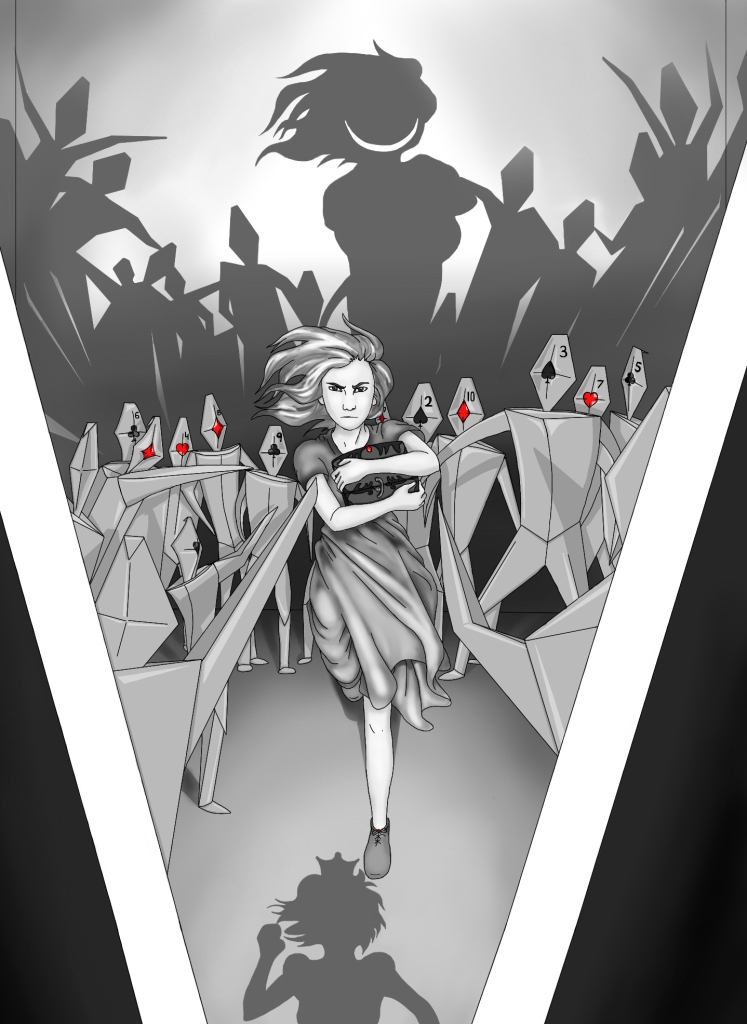
Josh also writes, a lot. He wrote an Alice poem for Alice Unbound, but I did not accept it. Professional writers are used to rejection and even from their friends. And editors often have more good stories or poems than they can accept. I remember Josh capturing the madcap way of a Lewis Carroll world. Well, it seems that that challenge also spurred him to even greater things. Josh has now completed a book, Alice Zero. Without further ado, I’ll let Josh speak for himself about his latest project.
It’s all Colleen’s fault.
I mean it. It was her idea. Kind of. Sort of.
Colleen had this great idea for a Lewis Carroll anthology and she invited me to write for the anthology. I was flattered. I said yes. Of course I will write for you. Colleen is an awesome human being with a great gift for poetry and prose herself, and to be recognized is just awesome.
Once I said yes, I realized that I had put myself into a conundrum. What can I possibly say about Lewis Carroll that hasn’t already been said? I mean, I love Alice in Wonderland and knew that I wanted to write something about wonderland. But what exactly?
That night, I went to a bar and remembered meeting a girl with a gorgon tattoo. Now I was eventually turned down because she plays for the other team, but there was something magical about this woman. Not just the tattoo she created on her arm, but she was just an intriguing, artistic, wonderful human being. She’s still a good friend of mine to this day. We talked for a bit, and I promised I’d put her in my story.
The gorgon was something I needed to see. Medusa is a fun character. She is an interesting monster, and beautiful and deadly. In wonderland where up is down and right is wrong, perhaps, she’d be a hero? I imagined a gorgon knight protecting Princess Alice from the depths of the shadows in this weird world of wonderland.
And then I made the magical connection. What if I did a mashup of Alice in Wonderland as Greek mythology? What if Alice was Pandora? It made a lot of sense in a lot of ways and I was so happy. If it wasn’t for Colleen I truly don’t believe I would have met my friend. It wouldn’t have been a problem I needed to solve. I wouldn’t have thought to go to the bar, and I never would have had the opportunity. I would have missed so much.
So I had my story. Greek Alice. And it came to me, this asylum with the playing cards being her jailers and the warden being the Queen of Hearts. Alice is on a quest to find herself. She opened the box, and now must face the consequences of her actions.
I wrote it and had a blast and handed it to Colleen. I was so happy. Then Colleen rejected it. It was her decision, and I understood. The collection didn’t need another Alice story, but I was so happy with my Alice story that I wanted to do something. Some things, actually. Stay tuned for the following year. But I wanted to work on doing something on my own.
I have to admit I got in my own way for awhile. I’ve done the epic poetry thing with Mirror World Publishing and I loved that I got the chance to do so. But this is me again, for the first time. At least this time I got some help. Kenzie Carr is an amazing world class artist. I’m hoping we continue this collaboration as she did some killer things inside. Love her work and was pleasantly surprised how it all came about.
I had other people help out too. Vanessa Cardui did a wonderful job advising me, and I listened to a few others as well. Thank you, all.
Finally, here it is, courtesy of myself and Kenzie Carr. I never would have done it if it had not been pushed in that direction if it hadn’t been for an email from a dear friend. Colleen, it’s all your fault. But I’m so happy you were the catalyst in this. Thank you for being an amazing friend and an inspiration. Keep being you.
Perhaps, Josh gives me too much credit. Without his own imagination and talent, he would not have even created this. But it’s true that we can be inspired and spurred in new directions by others. Josh, I’m glad a tree grew from the sprout. I’ll be reading his work lately to see what crazy things Alice gets into. I hope you considering exploring his worlds as well.
Filed under entertainment, fairy tales, fantasy, myth, Publishing, Writing
Saba Syed Razvi is today’s guest, on the leap day of February. You’ll find that besides her poems, her answers are poetic as well. Note that due to special formatting her poems are put in as pictures to maintain the integrity. Thanks for stopping by for Women in Horror Month.
When did you discover poetry and who/what influenced you?
Honestly, I cannot remember a time in my life when I wasn’t around poetry. My parents recited poems to me alongside lullabies, and I learned to memorize and recite them back. Sometimes we sang them. Sometimes they were in English, and sometimes they were not. I read poems to my younger sisters, often. I think I wrote my first poem when I was in kindergarten; it was about seeing colors beyond the darkness, and the letter M–and maybe also about M&M candies! So, for me, poetry and music have always been linked– and have probably always been about sugar as much as shadow. In the ghazal tradition, in the lyric tradition, there is music alongside the musicality of verse, and those sounds are in my earliest memories. Perhaps that music from distant dunes and distant drums, from ancient flutes and a longing for new ones, has always influenced my understanding of the capacity for language to invoke something of an otherworldliness in the otherwise worldly words on our tongues. As an academic, I’ve made poetry the terrain of my scholarship and search, so I am heavily influenced by the traditions I have encountered along the way. The poet I am today has probably been mostly influenced by Baudelaire, Dickinson, HD, Lorca, by Rumi and Hafez, Ghalib and Attar. I’m fascinated by the logic of the ancient world, and the language that carries its shadows into the new world in which we live and in which we create technologies for the death of living.
Why do you write poetry?
The world around me bears song and light, and sometimes I want to share it. Poetry isn’t like prose. One can sit down to tell a tale, and make it happen by plotting it and mapping it out, but poetry needs something of a living fire inside of it. When I feel the world alive in me, or when I feel the anxious spectre of death nagging at me, at the things in my life I hold most dear, I feel compelled to write them into being, just a little. Sometimes, it’s my anger that I want to seal into a vessel of verse, and sometimes it’s my grief. Sometimes, the beauty of the impossible is what breaks my heart. I write poetry because I am compelled to write it, because sometimes I feel like the words are lightning on the tongues in heart, like the world is bleeding from fingers, aching to spill free. Poetry is born from an image that takes root like a madness, from a thought that leaves me haunted, leaves me hunted, and the writing is a way to put it somewhere other than my nightmares.
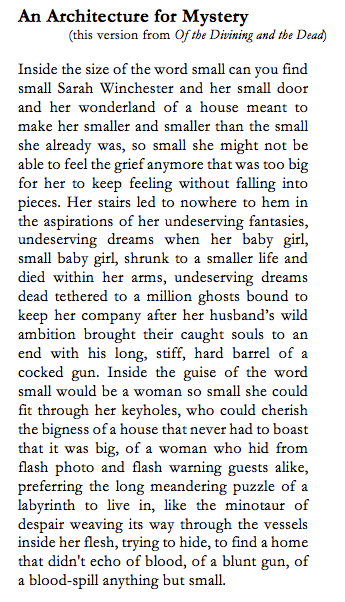
What do you think is the most difficult aspect in writing poetry?
The other day, in a class, I talked to my students about the difference between the source of inspiration and the process by which it is crafted into a work of literary art. Someone once called that the distinction between flame and fuel. I think it is more than inspiration or expression. I think poetry is a kind of alchemy of the self. Every poem takes something of who we are and transforms it into an offering. We take some aspect of ourselves, who we are at the core, at the most real, and we shape something from it. Maybe it comes from a desire of our shadow selves, or from the light of a lovesick delirium and its 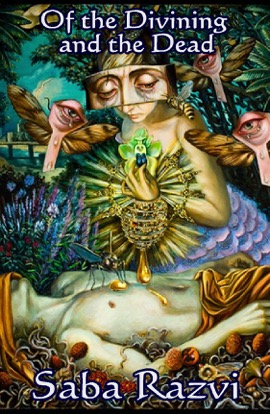 longing for the world. The most difficult aspect of writing poetry, then, isn’t finding the shape or the words or the idea, it’s the ability to let the world go long enough to invoke the energy that is the poem, to bring it into being. The ordinary world in which we all live is filled with obligations and tasks, responsibilities to be checked off and managed. We flit from one thing to the next, barely being in the world despite the time we spend. Poetry demands a deeper engagement, a vulnerability that comes from setting down those other duties and reins. I think the most difficult aspect of writing poetry is the point in the process when we must let go of our grasp on the ordinary world, trust our tether to allow us a space to create and a path to return. Composing poetry is a bit like falling into a trance; it isn’t something you can do while driving to the post office, but something you have to lean into. It needs deep time, and finding that time can be a challenge in our modern, busy lives!
longing for the world. The most difficult aspect of writing poetry, then, isn’t finding the shape or the words or the idea, it’s the ability to let the world go long enough to invoke the energy that is the poem, to bring it into being. The ordinary world in which we all live is filled with obligations and tasks, responsibilities to be checked off and managed. We flit from one thing to the next, barely being in the world despite the time we spend. Poetry demands a deeper engagement, a vulnerability that comes from setting down those other duties and reins. I think the most difficult aspect of writing poetry is the point in the process when we must let go of our grasp on the ordinary world, trust our tether to allow us a space to create and a path to return. Composing poetry is a bit like falling into a trance; it isn’t something you can do while driving to the post office, but something you have to lean into. It needs deep time, and finding that time can be a challenge in our modern, busy lives!
Do you explore particular themes? What are they and why?
Each of my books and each of my chapbooks takes on a different sensibility, a different theme, as organizing principle. In the Crocodile Gardens takes on myth and nightmare, dream logic and prophecy; it is about how we are beyond how we choose to be. heliophobia is more concerned with the promises of the fairy tale and the archetype; it asks us to think about who we are in the darkness, how light and shadow shape the places we belong. Limerence & Lux is really all about the dangerous pull of desire, the nightmare of longing or the delight of restraint. Beside the Muezzin’s Call & Beyond the Harem’s Veil takes on a different kind of darkness; it takes up the issue of the ordinary lives of Muslim Americans and the horror of their reality in a world which does not want to see them as something other than a foreign enemy, a horror more based in reality than in the supernatural. Of the Divining and the Dead takes up issues of the end times, of the realm of the soul beyond the life of the living, of prophecies and oneiromantic realities, or logic built from the idea of an afterlife built from sufi ideas of the material world and a world beyond the veil of the known. I suppose that the connecting thread among them all is that I am really drawn toward the spooky and the weird in our lives. I tend to write about the things that leave us feeling unsettled, disarmed, bare to the elements and to ourselves. I also like to write about robots and the goth scene, so it’s not all morbid mayhem, all the time!
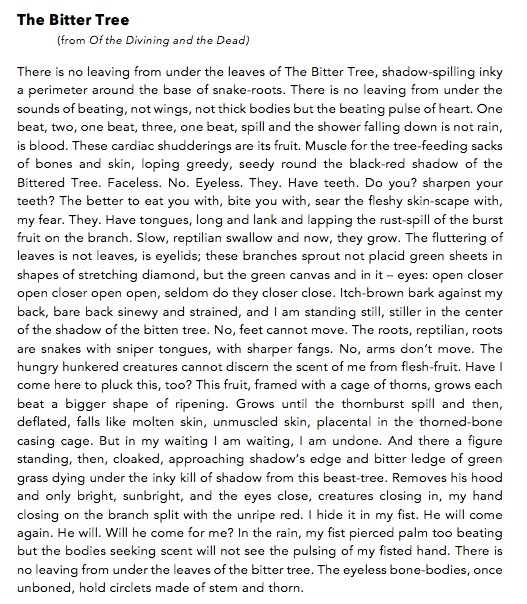
What is it about dark (speculative) poetry that you think attracts people to read it?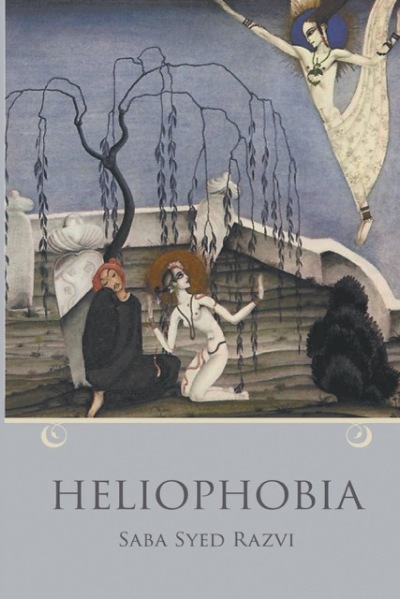
I think there is comfort in the darkness, honesty. Bliss and joy and rapture are all ways of expressing happiness, with some sorrow mixed in. I think that speculative and dark poetry tends to be willing to confront the aspects of our human experiences that we often hide away from the world of sunlight and manners. Dark and Speculative poetry asks us to consider our masks – and who we are beneath them, and what made us choose them anyway. It permits a depth of contemplation that we tend to shy away from in moments of levity. I think that such a complexity can be highly rewarding – and, ironically, remarkably illuminating, too. The Aurora Borealis is most stunning in the dark of solitude. In the dark and in the grotesque, we can find ineffable dimensions of the sublime.
What projects (publications) are you working on or have coming up?
I’m currently finishing up a book of poems featuring a haunted castle in Ireland, a game hunter, a captive faerie creature, domestic violence, environmental destruction, and the ghosts left behind by grief. // One of my stories – a short piece that blurs the distinction between prose and poetry, called “Haunted Hearts” was recently published by the international online literary journal Queen Mob’s Teahouse. My haunted castle collection leans heavily into the poetry of the poems, if that makes sense, though a narrative is woven by the poems in the collection; it embellishes more of the grotesque. The story I’ve mentioned gives you a different sense of my appreciation for the things that haunt us, and it is tethered not by the emotional dimensionality of language, but by the shadows in the narrative and the outlines they bring to our attention. // If you haven’t checked out the Horror Writers Association Poetry Showcase Volume VI (it’s filled with some wonderful poems by a lot of cool people), please do – and read my poem in it about vampire mermaids & Fukushima.
Is there anything else you would like to say about writing, horror or poetry?
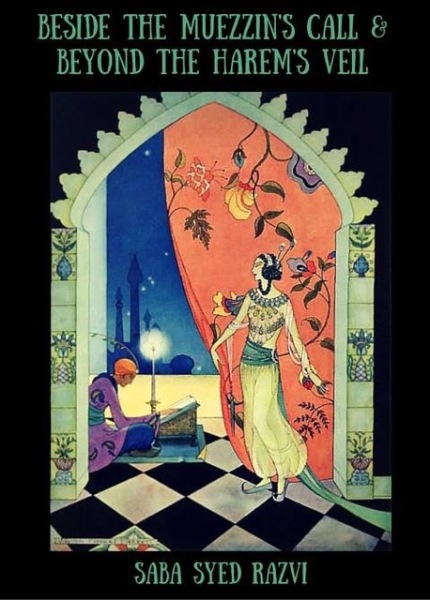 About my poetry: I like to test the limits of language, its textures and materiality, its logic and its magic. My poems are often fashioned into invented or embellished forms, sometimes inherited from gestures of divination or worship, from storytelling and from science. I tend to prefer things that are complicated, that slip between our expectations, and I write poems in such a manner that exaggerates such a sensibility in my form and my cadence. I’m not interested in making the familiar new, but in making the weird even weirder. My formal innovation and defiance of strictly traditional forms is a kind of linguistic play and ritual, all at once. As such, I tend to be drawn to and to explore literary works that blur the lines in all ways. A rebel on the page, if not in life! My academic research tends to explore more social and communal aspects of literature, technology, science, and the speculative. I’m drawn to the ways in which our literature reaches back into our human heritage, and what it projects forward with its words and with its technologies. After all, our language is all haunted and its words are the machines through which we experience those echoes of memory and the valence of the expression. I’m interested in work that blurs the lines and the distinctions, that deliberately transgresses the structures of literary art and human experience. It is my hope that my own work can inspire the same kind of interest in others as I feel for the things I write about and the things study.
About my poetry: I like to test the limits of language, its textures and materiality, its logic and its magic. My poems are often fashioned into invented or embellished forms, sometimes inherited from gestures of divination or worship, from storytelling and from science. I tend to prefer things that are complicated, that slip between our expectations, and I write poems in such a manner that exaggerates such a sensibility in my form and my cadence. I’m not interested in making the familiar new, but in making the weird even weirder. My formal innovation and defiance of strictly traditional forms is a kind of linguistic play and ritual, all at once. As such, I tend to be drawn to and to explore literary works that blur the lines in all ways. A rebel on the page, if not in life! My academic research tends to explore more social and communal aspects of literature, technology, science, and the speculative. I’m drawn to the ways in which our literature reaches back into our human heritage, and what it projects forward with its words and with its technologies. After all, our language is all haunted and its words are the machines through which we experience those echoes of memory and the valence of the expression. I’m interested in work that blurs the lines and the distinctions, that deliberately transgresses the structures of literary art and human experience. It is my hope that my own work can inspire the same kind of interest in others as I feel for the things I write about and the things study.
Saba Syed Razvi, PhD is the author of the Elgin Award-nominated collection In the 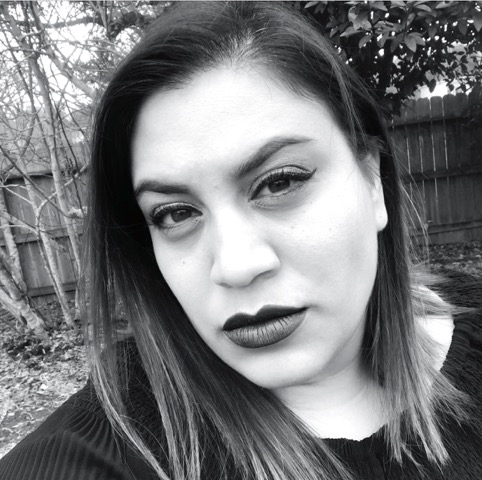 Crocodile Gardens (Agape Editions) and the collection heliophobia (Finishing Line Press), which appeared on the Preliminary Ballot for the Bram Stoker Award ® for Superior Achievement in Poetry, as well as the chapbooks Limerence & Lux (Chax Press), Of the Divining and the Dead (Finishing Line Press), and Beside the Muezzin’s Call & Beyond the Harem’s Veil (Finishing Line Press). She is currently an Assistant Professor of English and Creative Writing at the University of Houston in Victoria, TX, where in addition to working on scholarly research on interfaces between contemporary poetry and science and on gender & sexuality in speculative and horror literature and pop-culture, she is writing new poems and fiction.
Crocodile Gardens (Agape Editions) and the collection heliophobia (Finishing Line Press), which appeared on the Preliminary Ballot for the Bram Stoker Award ® for Superior Achievement in Poetry, as well as the chapbooks Limerence & Lux (Chax Press), Of the Divining and the Dead (Finishing Line Press), and Beside the Muezzin’s Call & Beyond the Harem’s Veil (Finishing Line Press). She is currently an Assistant Professor of English and Creative Writing at the University of Houston in Victoria, TX, where in addition to working on scholarly research on interfaces between contemporary poetry and science and on gender & sexuality in speculative and horror literature and pop-culture, she is writing new poems and fiction.
Website: www.sabarazvi.com
Links to Books:
In the Crocodile Gardens, Agape Editions. From Amazon
heliophobia, Finishing Line Press. From Amazon
Beside the Muezzin’s Call and Beyond the Harem’s Veil, Finishing Line Press. From Amazon
Limerence & Lux, Chax Press.
Of the Divining and the Dead, Finishing Line Press.
Filed under Culture, entertainment, fairy tales, fantasy, horror, myth, poetry, Writing
 Carina Bissett graces the virtual pages for Women in Horror Month. The month is nearly at an end but the poetry continues strong.
Carina Bissett graces the virtual pages for Women in Horror Month. The month is nearly at an end but the poetry continues strong.
When did you discover poetry and who/what influenced you?
I have always been interested in the cadence and presentation of poetry, but it wasn’t until I read Anne Sexton’s Transformations that I realized I could walk the path of a poet. The real turning point for me was when Terri Windling invited me to write a fairy tale poem for Endicott Studio. That was two decades ago, and I’ve continued ever since.
 Why do you write poetry?
Why do you write poetry?
For me, poetry is the perfect place to explore themes and imagery, both of which tend to drive my work. Not every image pairs well with the narrative drive expected in short fiction or novel-length work, but poetry is perfect for that sideways glimpse into wonder.
What do you think is the most difficult aspect in writing poetry?
Usually, a poem will take as long, if not longer, to draft than a short story. I like to taste the syllables, shift sounds. I enjoy imposing structure on my poems even if they start out as free verse. That reinforcement often makes me look at lines in a different way. It can be frustrating writing to form, but sometimes it also opens doors to places I never expected to find.
Do you explore particular themes? What are they and why?
All of my work is grounded in fairy tale and myth. The themes that tend to crop up in my work revolve around female relationships, estrangement and isolation, and domestic violence. Fairy tales have been a source of comfort for me since I was a young girl. Even then, I worked through issues in my personal life through the lens of fairy tale. As I grew older, I was introduced to feminist re-imaginings of these stories with The Bloody Chamber by Angela Carter. There is a special sort of freedom that comes from taking a well-known story and turning it on its head. In my own work, I tend to gravitate towards the fairy tales I hate the most. In rewriting them, I’m also to able to re-envision and explore my own personal narrative.
Swimming with the Shark Boys
I was warned to be wary in water,
especially when swimming with the sharks.
But those were the boys I always liked best,
with their slick-backed scalps, sharp smiles,
and eyes like bottomless pits.
I recognize them by their restlessness,
the subtle gleam as they cut through the crowd,
the shimmer of shadow in a clear sky.
But others also watch them prowl.
Deadly beauty attracts admirers
seeking the sharp taste of fear.
I watch mermaids flirt through a mirror’s lens
as they pout full lips and flaunt dangerous curves.
Scales glitter in a practiced seduction
as they comb hair perfect for binding men.
The shark boys just laugh, teeth bared.
The sirens orchestrate a counterpoint,
chaos conjured from the deep, dark places.
They measure out the notes of seduction,
drowning the protests of the waves
relentlessly breaking upon the rocks
— a requiem for the dead.
My selkie sisters and I know better
than to venture out of reach of safe shores.
We cinch our seal skins tight around our waists,
watching for the warning signs,
the scent of blood on the waves.
But every time one of the shark boys turns,
gliding out of the gloom with graceful ease,
I can’t help but wonder how it would feel
to shed my skin, press flesh on flesh,
smother in a crush of deadly kisses,
falling into the abyss.
## published in Mythic Delirium, May 2016. It also received an Honorable Mention from Ellen Datlow in 2016 for Best Horror of the Year, Vol. 9
What is it about dark (speculative) poetry that you think attracts people to read it?
Once, when I was a young woman, I was caught out in the desert during a particularly intense storm. Once the rain let up, I left the safety of my car to explore the new world that was left behind. When I looked at the ground, I discovered beads of polished obsidian everywhere. The rain had washed away the top layer of accumulated dirt to reveal these beautiful memories created by volcanic activity millions of years ago. I think dark poetry is akin to those obsidian pebbles, otherwise known as Apache tears. That darkness already exists, and the poets who work with this subject matter are simply exposing those gems for readers to discover.
What projects (publications) are you working on or have coming up?
I’m currently working on a collection of poems about monstrous women in myth and 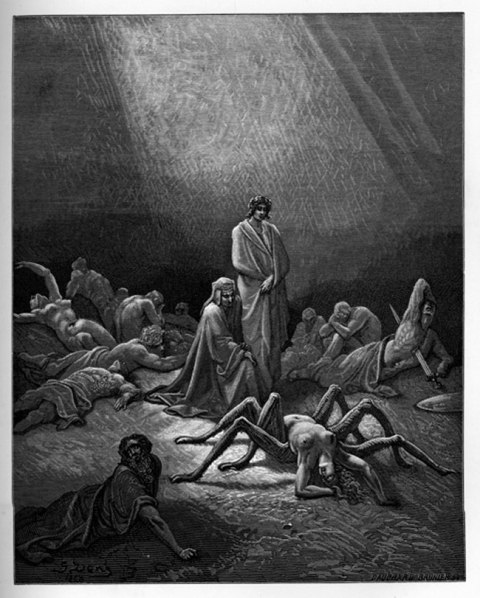 fairy tale. I also have a Snow White retelling coming out in Arterial Bloom, which was edited by Mercedes Murdock Yardley and is scheduled for release by Crystal Lake Publishing in April 2020. It features some wickedly gorgeous work, and I’m ecstatic that my story is included in this anthology.
fairy tale. I also have a Snow White retelling coming out in Arterial Bloom, which was edited by Mercedes Murdock Yardley and is scheduled for release by Crystal Lake Publishing in April 2020. It features some wickedly gorgeous work, and I’m ecstatic that my story is included in this anthology.
Is there anything else you’d like to say about writing, horror or poetry?
In addition to writing, I’m lucky enough to work with other writers in my online, generative workshops at The Storied Imaginarium (https://thestoriedimaginarium.com/). These writers have created an incredibly supportive writing community, and many past participants have gone on to publish stories and poems generated in workshop. Just a few of the recent anthologies featuring their work include The Twisted Book of Shadow, Not All Monsters, and Miscreations: Gods, Monstrosities & Other Horrors. Seeing these writers’ successes gives me great joy. It has been a wonderful experience, and I look forward to seeing what they will write next.
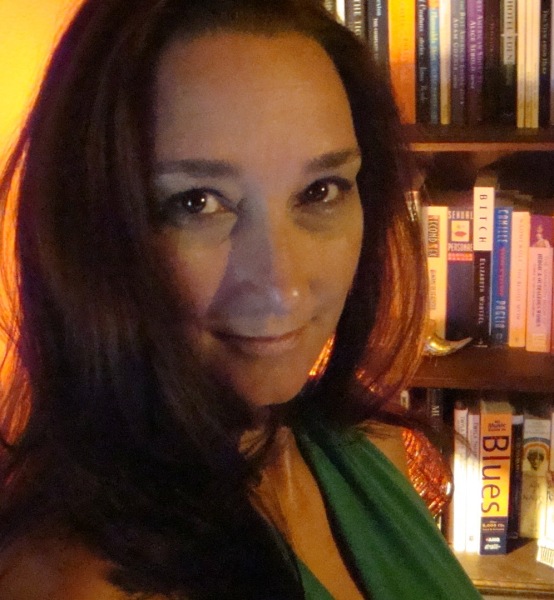 Carina Bissett is a writer, poet, and educator working primarily in the fields of dark fiction and interstitial art. Her short fiction and poetry have been published in multiple journals and anthologies including Arterial Bloom, Gorgon: Stories of Emergence, Hath No Fury, Mythic Delirium, NonBinary Review, and the HWA Poetry Showcase Vol. V and VI. She teaches online workshops at The Storied Imaginarium, and she is a graduate of the Creative Writing MFA program at Stonecoast. Her work has been nominated for several awards including the Pushcart Prize and the Sundress Publications Best of the Net. Links to her work can be found at http://carinabissett.com.
Carina Bissett is a writer, poet, and educator working primarily in the fields of dark fiction and interstitial art. Her short fiction and poetry have been published in multiple journals and anthologies including Arterial Bloom, Gorgon: Stories of Emergence, Hath No Fury, Mythic Delirium, NonBinary Review, and the HWA Poetry Showcase Vol. V and VI. She teaches online workshops at The Storied Imaginarium, and she is a graduate of the Creative Writing MFA program at Stonecoast. Her work has been nominated for several awards including the Pushcart Prize and the Sundress Publications Best of the Net. Links to her work can be found at http://carinabissett.com.
O MAD ARACHNE: A Folle in Three Acts
ACT I
Of course she’s bent
back, legs splayed
open for inspection
pride punished, Purgatory
reflected on a monster,
flanked,
an Infernal tapestry,
color curled,
secrets spun by sinners
who dared to fly to close
to the sun.
ACT II
In her Wisdom,
the goddess punished
the girl, a weaver, who needed
to learn a lesson—
as all girls do.
After all,
maidens are meant to be seen,
not heard.
Hubris for humanity,
despair hanging,
suspended, judged,
a tapestry of tragedy
wrought in twisted limbs,
bruised breasts, plundered spoils
of a war undeclared,
unquestioned.
ACT III
Talent?—Never, the matron
says. Wait!
The time will come—
an hour-glass counting down
minutes slipped,
regret shrouded,
ghosted, shed, obscure
glory days remembered
on cigarette breaks,
red lipstick smeared, feathered
lines, regret drowned,
boxed wine.
Remember, the matron says
to the dumpster, remember
she says to the stray
dog-bear, winged beast
remember, she says
to the spider who stares back,
eight eyes reflecting pride
shattered—
a warped mirror.
Inside the diner, a girl,
so young, so beautiful.
An artist—
a peer, a student, a child.
Listen, the matron says, stern,
unyielding.
An echo.
Wait.
The cycle resets.
## NonBinary Review #19 Dante’s Inferno, Zoetic Press. December 2018. The image above of Arachne is by Gustave Doré and is in the public domain. It was the inspiration behind this poem.
Facebook: https://www.facebook.com/carina.bissett.5
Twitter: @cmariebissett
Pinterest: https://www.pinterest.com/cmariebissett/
Amazon: https://www.amazon.com/Carina-Bissett/e/B00UK8VKDS%3Fref=dbs_a_mng_rwt_scns_share
Goodreads: https://www.goodreads.com/cmbissett
Filed under entertainment, fairy tales, fantasy, horror, myth, poetry, relationships, Writing
 Today’s guest is LindaAnn LoSchiavo, who hails from New York, where she writes poetry and does dramatic presentations as well.
Today’s guest is LindaAnn LoSchiavo, who hails from New York, where she writes poetry and does dramatic presentations as well.
When did you discover poetry and who influenced you?
As a toddler, I discovered rhymed verse in books and on Hallmark cards.
My first poems were written at 3 ½ years old. My parents, who were living in the basement of a building owned by my maternal grandparents, quarreled often. Invariably I retreated to the peaceful second floor to be with my native Italian grandparents and my two unmarried aunts. My Aunt Fay was, like her father (i.e., my Grandpa Umberto), artistic and always sketching. My first poems were written to coordinate with her drawings: ballerinas, clowns, balloons, flowers, the Statue of Liberty, Coney Island’s Ferris wheel, dogs, cats, swans, birds, or squirrels.
My first stage play was written at 9 years old; it was seen onstage for 11 months in Brooklyn, NY.
Why do you write poetry?
I write poetry (as well as fiction, stage plays, drama criticism) because I have many things to say and a unique viewpoint.
However, I write ghost poems because of many encounters with wraiths.
What do you think is the most difficult aspect in writing poetry?
The ever-changing, increasingly fragmented marketplace. And the disappearance of good journals where many poets felt welcomed.
Do you explore particular themes? What are they and why?
My poems constellate into images orbiting certain themes: Italian culture, Catholicism, erotica, romance, disappointed or abused women, mythology and other speculative themes.
My upcoming event (March 21, 2020) is called “Verses Sacred & Profane: A Spicy Literary Lushness for Lent” https://www.eventbrite.com/e/verses-sacred-profane-a-spicy-literary-lushness-tickets-89928964955 I’ll be reading Catholic poems with a Lenten theme as well as erotic poems from my two new books.
Concupiscent Consumption, Red Ferret Press, 2020, is a collection of erotic poetry. This 24-page chapbook starts with kissing and explores seduction, temptation, the genitalia, bondage, whipping, adultery, etc.
A Route Obscure and Lonely, Wapshott Press, 2020, focuses on spec-po. This 54-page collection explores a variety of fantasy, sci-fi, mythology, and dark horror themes. Since you are spotlighting “Women in Horror,” let me mention some of my ghastly poems in this book: “Unquiet House,” in which two vampires pose as home-buyers in order to sacrifice a real estate agent; “The Tale of the Vintner’s Daughter,” which takes the Jane Austen marriage plot approach to an eligible bachelor named Count Dracula; “Footprints in the Snow,” about an abused wife who returns to haunt the home she was murdered in; “Embodiment,” about a woman slain by her boyfriend, who returns at bedtime to sleep in her younger sister’s room;”A Ghost Revisits a Tattoo Parlor,” a victim of domestic violence watches his new bride, who is getting her husband’s name tattooed; “Endless Night,” the frightening one you’ll never wake up from.
I hope someone who reads this interview would like to review my book.
The Tale of the Vintner’s Daughter
“It is a truth universally acknowledged that a foreign bachelor,
in possession of a drafty castle, must be in want of a wife.”
She overheard her parents mentioning
A vast estate, long vacant, just changed hands.
Inheritance. Fortunate foreigner,
Related distantly. A gentleman —
Aristocrat — whose bloodline staked his claim,
Will take possession soon of Mount Ardeal.
Townsfolk with daughters gave approval, sight
Unseen. A bachelor! Well circumstanced!
Considering an heiress gets respect
At any age, she was insulted when
Her father dared to call her “an old maid.”
Inspecting manicured and chaste white hands,
Aware there’s merit in matched wedding bands,
Realities of warring unmet needs
Upbraid the tight lips of virginity.
Receptions will be held, bite-size buffets.
This heir, unknown, is suddenly “a catch.”
The vintner’s daughter can sense life’s about
To change once she’s in a relationship.
Enchanting friendships could lead to courtship.
Her early childhood memories were filled
With bone-dry men admitting they had come
To slake their thirst, which is unquenchable,
She learned, while watching mother pour and pour.
Vacationing at vineyards tutored her.
She watched the women kneeling to tie off
Vines — how their expertise was in the knots
Not grapes — enduring, bending, bowing low,
And salving calloused hands at quitting time.
Admiring the fruitfulness of their
Harvest on horseback, they see an ornate
Black carriage pass, its curtains tightly drawn.
It must be him, the heir they’ve heard about.
Born in Romania, this bachelor
Inherited five castles, acreage.
Unlike the grapes, their ripening athirst
For sun, he shuns daylight, potato like,
Basks in his soft cocoon of native soil.
Their fête won’t start till red horizon’s drained
And autumn air’s electric with decay.
Assuming his disguise, Count Dracula
Arrives, polite, attired properly,
Seductive, well turned out considering
He can’t see his reflection. Mirrors won’t
Hold him. Avoiding long engagements, he’ll
Tell ladies he prefers to sleep alone.
Echolocation guides his strong black wings
To candle-lit bed chambers. Milky white
Breasts, pleasure’s playthings, don’t stir his manhood.
Sharp fangs seek virginal smooth necks. Always
His type, blood’s sustenance is what he craves,
Imagining the process from the grave.
He’s parched when entering the ballroom.
Delaying satisfaction sweetens it.
Unmarried females study him, inspect
His gold ancestral jewelry engraved
Impiously. Flirtatious words affect
The vintner’s daughter, nodding glassy-eyed,
Intoxicated. His gaze penetrates
Until she’s under his hypnotic sway.
The heiress has arranged to meet the Count
In private. At eleven they will mount
Their horses, undetected, take a ride.
Discreet, she’ll hide in the orangerie,
Alerting him to the romantic grove
By a rose petalled trail, a daring ruse.
Excited to imagine his caress,
The dark dissolving inhibitions, she’s
Startled by flapping wings overhead.
Peculiarly, her petals were consumed.
Spotting a white handkerchief on a chair,
She rests her rosebuds there — a silent prayer.
## from A Route Obscure and Lonely
What is it about dark (speculative) poetry that you think attracts people to read it?
Presented via stage plays and motion pictures, dark horror attracts viewers who enjoy being scared–but from a safe distance. There was a time when you could not access these spooky, goose-bumpy plays or films at home; you had to be in a theatre.
But you could always take a harrowing thriller or dark poetry to bed, beckoning the boogeyman (page by page) into your own private space, challenging yourself to picture the blood, the monstrosity, the ever-present evil–and somehow cope with it.
Personally, I like to re-read dark poetry to learn something about what type of demon unnerves me the most.
This scientific explanation fascinated me. According to Dr. Steven Schlozman, a Harvard University professor and the author of The Zombie Autopsies: Secret Notebooks from the Apocalypse, that’s because those are two very different experiences at the neurological level. He said, “I expect a much stronger kind of physiological arousal from a horror film.
“The studies of what your brain looks like when it’s experiencing a story told visually vs. a story told through written narrative — so reading as opposed to having it read to you — are pretty clear,” Schlozman added. “Although reading horror lights up the parts of the brain that deal with space and time, ‘When you watch a movie, those areas don’t get as engaged, in part because it’s already been done for you on the screen. So if you’re into your own kind of worldbuilding, like imagining something without it being shown to you, then you read the story. If you want to have the challenge of pattern recognition not making sense, then you watch the film.'”
Source: “Why Do You Love Horror Even Though it Freaks You Out? Here’s What the Experts Say” by K.W. Colyard, posted in Bustle on Oct 30, 2019
What projects (publications) are you working on or have coming up?
Launching two books at once, a.k.a., wearing the winged Author Hat, involves organizing events, seeking reviews, and creative marketing. However, I am eager to return to these long-form projects on my desk:
(a.) “Elfriche” [narrative poem in blank verse]–after a fairy watches a naked male washing his genitals in a stream, her curiosity spirals into infatuation, then lust. Her yearning makes her seek out a troll who sells love potions. Unintended consequences result. Genre: Fantasy and horror.
(b.) “The Pryderi Solution” [short story]–after her healthy husband becomes bed-ridden due to low-lung volume, Annie’s life spirals downward. Her best friend, who has mysteriously recovered from her “incurable” auto-immune disorder, tells Annie about an expensive untraditional healer, Tamiesin, who can sell her a permanent cure, the Pryderi Solution. In order to pay for this solution, Annie decides to do some reprehensible things. Unintended consequences result. Genre: Fantasy and horror.
(c.) “The Pianist and the Djinni” [novella]–the Reeding family has inherited a 19th century haunted house where Ewan Reeding (the paterfamilias) has grown up. Since his business travels often take Ewan Reeding abroad, his lonely wife Desiree takes a lover and becomes pregnant. Terrified that the birth of this love child will tear the family apart, teenage daughter Carnella tries to stop this illegitimate son from being born, unaware that there are opposing dark forces who have their own feelings about this illegitimate heir, and that she will be forced to bargain with violent spirits who intend to keep the house’s monstrous history buried. Deeper complications arise as Carnella begins to fall under the spell of the ghost of her great-uncle Ainsley Reeding, the dark lord of the house.
This fast-paced novella, set during Desiree’s final trimester, is based on my own stage play with the same title. Genre: Fantasy and horror.
(d.) “Nightfall at Shadow House” [screenplay]–Since female portraitists never seem to advance in the NYC art world, Jennice Mortimer accepts an invitation from an uncle she’s never met (who spent his career in India), who claims his British art world connections will help her. A bachelor, Harrison Mortimer resides in rural England on a dilapidated estate that Jennice will inherit.
Right before she flies to Britain, Jennice’s fiance dumps her but she decides to visit Uncle Harrison Mortimer all alone. It will take Jennice awhile to realize that this affable, generous gentleman is not her uncle but an impostor. Also unknown to her, the Hindi-speaking residents of Shadow House have been under investigation for stolen antiquities, looting, and tax fraud.
A detective, hired to track this art thief, assumes Jennice is his accomplice and follows her to England. Still in the dark about this charming impostor, Jennice rebuffs the detective, at first.
However, by accident, she resurrects the former resident of her bedroom at Shadow House, a peerless pastelist who meddles in this affair by using Jennice’s art supplies to paint clues. Complications will ensue before Jennice realizes her ghost-cousin is protecting her, the detective is falling for her, and the impostor has her real Uncle Harrison chained up and starving in a shed.
Is there anything else you would like to say about horror or poetry or writing?
I’m not alone in wishing there were more zines that offered payment to poets. And when I see the same SFF bylines dominating the good magazines, I can’t help but wish these editors were more welcoming to new names. I’ve written two plays about Mae West and maintained this daily blog for over 15 years.
LindaAnn LoSchiavo is a dramatist, writer, and poet. Her poetry chapbooks Conflicted  Excitement, Red Wolf Editions, 2018, Concupiscent Consumption, Red Ferret Press, 2020, and A Route Obscure and Lonely, Wapshott Press, 2020, along with her collaborative book on prejudice [Macmillan in the USA, Aracne Editions in Italy] are her latest titles. She is a member of the Dramatists Guild and SFPA. Her speculative fiction has won two Honorable Mentions from Writers of the Future. Her ghost poem “Footprints in the Snow” won an award from Dually Noted (March 2019).
Excitement, Red Wolf Editions, 2018, Concupiscent Consumption, Red Ferret Press, 2020, and A Route Obscure and Lonely, Wapshott Press, 2020, along with her collaborative book on prejudice [Macmillan in the USA, Aracne Editions in Italy] are her latest titles. She is a member of the Dramatists Guild and SFPA. Her speculative fiction has won two Honorable Mentions from Writers of the Future. Her ghost poem “Footprints in the Snow” won an award from Dually Noted (March 2019).
* * Interview: https://www.thepoetmagazine.org/interview-with-lindaann-loschiavo Her new website LindaAnnLoSchiavo.com is forthcoming.
GoodReads: https://www.goodreads.com/user/show/110279531-lindaann-loschiavo Amazon author page: https://www.amazon.com/-/e/B084WSGD5K
 When did you discover poetry and who influenced you?
When did you discover poetry and who influenced you?
Back in high school, I had a great teacher in my senior year who firmly taught us all that there was a clear and distinct difference between good writing and bad, and that poetry could easily be discerned as “good” or “bad” by applying tools to it–tools like looking for double-meanings and ambivalence and metaphor and so on. I took that first set of tools with me through college and grad school, where I focused on medieval and Renaissance literature, from Beowulf and Chaucer through Spenser and Shakespeare.
. . . and then I started writing poetry, and selling poetry, and I’m no longer convinced that there’s “good” poetry and “bad;” I think there’s “what’s to someone’s taste, and being lucky enough to find an audience for your voice” and that the world is a wonderfully more weird and complicated place than is dreamt of in your philosophy, Horatio.
Why do you write poetry?
Why do I write poetry? That’s a good question. And the answer is manifold. Sometimes, I have an image or a word I can’t shake, and it doesn’t quite have a full story or a novel behind it, so I write the poem to get it out. Sometimes I write a poem because I’m angry or upset, and want to get *that* out. Sometimes I write poems as technical exercises, to prove, “yes, I can actually do a paradelle and have it make sense.”
Sometimes a poem written to a self-imposed prompt won’t leave me, and I wind up writing a longer story out of it. Or, as with last November, I wind up with a collection of poems that tell a narrative, and I find myself as compelled to finish that story as I ever have been with a piece of prose.
But in the end, I also write everything I write, poetry or prose, to communicate a thought or idea. I very rarely go for abstruse in my writing. I was a technical writer for just about twenty years, so my goal in everything I write is clarity and precision.
Hitogata
The world needs scapegoats and sin-eaters;
through which we might cast
our culpability into a doll,
a piece of bread, a slice of godly flesh,
washing them away in running water,
through which no evil spirit can pass,
or watch our sins slide,
sleekly buttered like a crumpet
past someone’s kindly lips,
erased and absolved,
taken on someone else’s shoulders—
oh, if only if guilt could be absolved
instead of perpetuated endlessly
in an endless cacophony online.
I swallowed my opinions,
buried them deep in my own gullet
where no one could hear my
confession and condemn me—
made my own flesh
my hitogata,
until I opened my eyes one night
to find myself surrounded
by a swarm of paper dolls
all wearing my face,
shuffling shiff-shiff, each to each,
as each flattened body slithered
under the door
to seek new homes.
I should have drowned them first.
## First published, Gyroscope Review, Issue 18-3, Summer 2018. Click here to hear Deborah’s reading of it on Gyroscope’s site!
What do you think is the most difficult aspect in writing poetry? Do you explore particular themes? What are they and why? {note: Deborah sort of answered these together so I have put the questions together as well}
While I was assembling The Gates of Never out of previously-published works, alongside pieces I hadn’t yet had published, I tried to organize them by theme; I think the two weaknesses of many chapbooks and collections are different faces of the same coin–either authors go very one-note, without any contrast of theme or tone, or they’re very scattershot, with wildly different pieces next to each other without any build or theme.
So I approached my first collection as, essentially, sheaves or folios of my work, organized by theme, stapled together. And thus I started with my more mythological and folkloric work, the historical faces of evil, or at least of indifference, the monsters out of the past. Then I moved through the fairy tale retellings, and then into the futuristic and scientific stuff–much of which connects back to the mythic as well.
Some reviewers have asked me, “Why all the monsters?” and the answer is, we learn who we are as humans, by looking at our darkest impulses. All of our monsters are always ourselves, at least in part. Some reviewers have talked to me about the passion in the poems–it’s there, sure. The desire to drown in another, and find yourself become someone new, when you’re a we, and no longer an I. . . and then the tension between the we and the I. . . all part of Eriksen’s crises, really, and I play in the Generativity column of his crises a great deal. And there’s also the thought that the past and the future are really all a part of the same thing.
Or you can read the poems and decide what they mean to you. I can’t control that. In fact, that’s one of the things that makes reading and writing so much fun!
What is it about dark (speculative) poetry that you think attracts people to read it?
I can’t speak for others, but what attracts me to dark speculative poetry is really how it can illuminate our current mental and social condition, through metaphor, through fractured mythology. All poetry does that, to a certain extent, but dark poetry takes a look at the monsters of our id and ego, drags them out into the light, and lets us see them–and ourselves–for who we really are. And might encourage us to aspire to be more.
What projects (publications) are you working on or have coming up?
I have two collections of poems and a chapbook all out making the publisher’s rounds, and looking at my Submission Grinder entries, I have a total of 115 things sitting in various slushpiles at the moment. That’s about average for me, and it includes short stories, flash, poems, collections, and more. There are a couple of larger projects I owe myself work on, but I’ve gotten derailed from for some time–so I’ll be looking to redress that in about April.
Testament
The burin’s edge slants across my flesh,
slicing through the skin
like copper plates, intaglio;
chiseling runes in the ink of my blood,
staining his fingers black.
The lines entangle, enjamb,
weaving ascenders and descenders
in tender embraces,
each word opening me further,
binding me, defining me.
He writes me upside down
and backwards, so that
I hardly know myself yet,
but my hundred newly-open mouths
whisper secret meanings,
and offer atramentum kisses;
he soothes my wounds with
copper vitriol, making the words
holy and incorruptible,
incapable of fading into sepia;
yet as he kisses me, our tongues meeting,
the words spark white-fire
under my skin, the runes writhing
into new configurations,
just as true as the ones he placed there;
I wrap myself around him,
the words press against him,
brand him, surge into his soul;
I pour into him as he pours into me;
I whisper his name against his ear
and bind him as he bound me,
press him as a leaf among my leaves.
## First published in Panoply, #7, Summer 2017; also appears in The Gates of Never
Is there anything else you’d like to say about writing horror or poetry?
I never thought I’d write poetry; it took my friend Michelle Muenzler mentioning that there was such a thing as speculative poetry, and that you could get paid for writing it, at my first convention back in 2015, to open me to the possibility. I never thought of myself as a “horror” writer; while I cheerfully employ dark elements to threaten and terrify my protagonists in novels and short stories, I’d never have thought of myself as at all akin to the horror writers I’ve read and enjoyed–I’d have considered myself closer to “dark fantasy” authors like Tim Powers, whose work I greatly enjoy. But here we are, which is to say that you’re never your own best judge of anything, so . . . go out and do stuff, and let other people worry about categorization!
Deborah L. Davitt was raised in Nevada, but currently lives in Houston, Texas with her  husband and son. Her poetry has received Rhysling, Dwarf Star, and Pushcart nominations and has been published at over fifty venues; her short fiction has appeared in Galaxy’s Edge, Compelling Science Fiction, and Pseudopod. For more about her work, please see www.edda-earth.com/bibliography. You can obtain her poetry collection, The Gates of Never, at https://www.finishinglinepress.com/product/the-gates-of-never-by-deborah-l-davitt/ and may contact her on Facebook at https://www.facebook.com/deborah.davitt.3 or on Twitter, @davittDL.
husband and son. Her poetry has received Rhysling, Dwarf Star, and Pushcart nominations and has been published at over fifty venues; her short fiction has appeared in Galaxy’s Edge, Compelling Science Fiction, and Pseudopod. For more about her work, please see www.edda-earth.com/bibliography. You can obtain her poetry collection, The Gates of Never, at https://www.finishinglinepress.com/product/the-gates-of-never-by-deborah-l-davitt/ and may contact her on Facebook at https://www.facebook.com/deborah.davitt.3 or on Twitter, @davittDL.
Filed under entertainment, fairy tales, fantasy, horror, myth, poetry, Writing
 Michelle Jeffrey is my guest poet today. She shows quite well the dark with her poems of pagans and mythic beings.
Michelle Jeffrey is my guest poet today. She shows quite well the dark with her poems of pagans and mythic beings.
When did you discover poetry and who/what influenced you?
I started writing poetry when I was six years old, so my early influences would have been traditional nursery rhymes and Dr. Seuss. I started exploring dark themes in my poetry when I was eleven, drawing from life experience. Later I was influenced by the work of T.S. Eliot, W.B. Yeats, Samuel Taylor Coleridge, and J.R.R. Tolkien.
Why do you write poetry?
I write poetry because my soul screams out for it to be written. I have been driven to write poetry from when I could first write. It is an integral part of my being and I could not imagine a life where I was not writing poetry regularly.
What do you think is the most difficult aspect in writing poetry?
I find it difficult to write poetry when I pick a subject and decide to write about it. My poetry is usually written about something I feel passionate about. The muse takes me and the words just flow from deep within my psyche.
 A Summoning of Demons
A Summoning of Demons
Oh fallen angel, oh spirit unclean
However heinous and obscene
Be thou but the fiercest fiend
From the very darkness weaned
Nurtured fast on dread and slaughter
Thou who dwell across the water
Beyond the bounds of space and time
From nether regions’ fiery clime
Come, cross the river of life and death
With burning eyes and blazing breath
Come hither now with ravening bent
In answer to this summons sent
Beelzebub, thou of envy and spite
Come storming from the realm of night
Belphegor, cause thyself to shift
Come voracious, across the rift
Asmodeus, thou who stirs the blood
Licentious, lust and passions flood!
Baal and Hadad, come together
With thou rain and stormy weather
Sathanus, wild with wrathful ire
Come thou from the realms of fire!
Mammon, heavy with rapacious greed
With appetite strong and avarice freed
Lucifer, proud with blinding light
That shines eternal burning bright
Demons mighty, strong and tall
Greatest gods before the fall
Indomitable, rampant, wild and savage
Unbridled, set to storm and ravage
Monstrous with malevolent grace
Hither, come unto this space
## Published in Spectral Realms No. 12, Winter 2020
Do you explore particular themes? What are they and why?
I often write about the natural world, such as the seasons, the rain, the sea and the moon. My poetry is often drawn from classical mythology and paganism; Gods and Goddesses and their stories.
What is it about dark (speculative) poetry that you think attracts people to read it?
I think some people like the thrill of immersing themselves in horror. They enjoy the feeling of being scared and contemplating something outside their day-to-day existence, beyond the bounds of the safe structures society builds around them. There is something about the meter of poetry that heightens the macabre experience, causing people to anticipate dread with a disturbing delight.
What projects (publications) are you working on or have coming up?
I am currently working on a ritual descent to the Underworld incorporating my poetry. I will be conducting the ceremony in the Temple of Baal Cave, one of the most spectacular limestone caves at Jenolan Caves, located in Australia.
Of Hooves and Horns
Within the depths of velvet forest
Something stirs
Elusive scent lichen and moss
Ferns and firs
Movement slight scarcely seen
Rarely caught
Shadows move the darkness dancing
Edge of thought
Wilderness walking stalking shadow
Soft sounding
Hooves clatter striking stone
Wild bounding
Taunting glimpse horned shadow
Falling light
Calling drawing through the veil
Darkness bright
 ## published in Call of the God: An Anthology Exploring the Divine Masculine Within Modern Paganism, 2015
## published in Call of the God: An Anthology Exploring the Divine Masculine Within Modern Paganism, 2015
(Also published in Spectral Realms No. 9, Summer 2018)
Is there anything else you want to say about horror or poetry?
My mother used to take me to see the Hammer gothic horror movies as a young girl, sparking off a lifetime love of the horror genre.
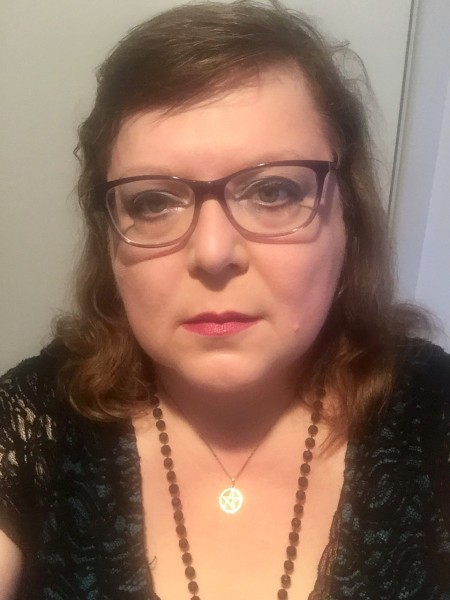 Michelle Jeffrey is a poet, artist, dreamer and cat whisperer who likes to weave mythology, music and poetry into the rhythm of rituals and ceremonies. She is a regular contributor of poetry and articles to pagan magazines in Australia. Her poetry has also appeared in the Spectral Realms: A Weird Poetry Journal and Call of the God: An Anthology Exploring the Divine Masculine Within Modern Paganism. Michelle resides in Sydney, Australia with her husband and two cats.
Michelle Jeffrey is a poet, artist, dreamer and cat whisperer who likes to weave mythology, music and poetry into the rhythm of rituals and ceremonies. She is a regular contributor of poetry and articles to pagan magazines in Australia. Her poetry has also appeared in the Spectral Realms: A Weird Poetry Journal and Call of the God: An Anthology Exploring the Divine Masculine Within Modern Paganism. Michelle resides in Sydney, Australia with her husband and two cats.
Twelve o’clock
Deeply engrossed
With the busy day’s clatter
Never expecting the sudden crack
Stunning my senses
Staring blindly
At the increasing void
The icy surface
So smooth, so still
The break was raw
Against all nature
It seemed
As if Hades had come
And dragged me down
As abruptly as
He had seized Persephone
Tearing me too
From the stable surface
Scattered flowers in my wake
## published in The Small Tapestry, Winter 2015
 Today’s guest is the well-published and award-winning Shannon Connor Winward.
Today’s guest is the well-published and award-winning Shannon Connor Winward.
When did you discover poetry and who/what influenced you?
Do you know—I’m only just making this connection now, but it was probably Shel Silverstein who truly showed me what poetry could be. I remember they had an album of his poems from Where the Sidewalk Ends and A Light in the Attic at our local library (which was pretty much my personal temple when I was a little girl). I must have borrowed that album a dozen times; I loved listening to it at night before bed, with all but the closet’s light off in my room. He had such a powerful, spellbinding voice, and an uncanny ability to tap into the imagination of children—that’s why he was (and is) so hugely popular and beloved. Obviously my tastes evolved (and darkened*) as I grew older, but I guess I must credit him with igniting the spark of my love for poetry.
*(To be fair, though, lots of Silverstein’s poems are pretty freaking dark!)
Why do you write poetry?
I write poetry because I was born a poet. That might sound romantic or grandiose or whatever, but that’s really what it comes down to. 🙂 Every part of my personality is built to observe the world and paint it with language.
What do you think is the most difficult aspect in writing poetry?
The biggest obstacles to writing poetry are self-doubt, real life, and politics. Self-doubt is the mind-killer, so many of us are kept silent or slowed down for too long. Then, there’s the struggle to find time to write, and to keep that commitment. Beyond that, the many many rivulets of politics and personalities in the poetry world make it extremely challenging to be heard as a poet, to say something relevant or useful, to be a good literary citizen, etc. It is definitely not an endeavour for the weak-of-heart.
Session
Last night I was in a field
under a heavy sun
surrounded by people chipping at the ground
people sifting dirt through a screen
people trying to make tableaus from shards of pottery
though there were never enough pieces.
I told them where to dig.
They uncovered the remains of a woman
and I knew
in the way you know in dreams
that she was me.
I knew also that there were others
so many more
a field of fragments
and they were also me.
I knew that men, like you, would come,
doctors,
that you would want to bring them up
that you would want to catalog them
ask me what I felt about them
and what I think it means
as if it were only
a metaphor.
I think you should look more closely.
Sometimes a cigar is also
a cigar.
The remains tell a story.
See, here, how the skull is not quite fused?
I was a child.
And yet, here, in the space between my hips
(where you measure with your fingers, like this
yes, just like this.)
I bore children. At least one.
Probably more.
Probably hundreds.
Open my mouth, look, and read
what I ate, or, sometimes
what I hungered for.
Sweetness, rotten
gaps, bits
gnawed and worn down to the root
charred bread and mistletoe, bits
of his hand
bit-back words, here
lodged in the throat.
Take my hand,
arthritic, my hand, useless, my hand
shattered, here; a defensive wound
my hands
clutched around my knees and frozen
on bright alpaca blankets, my hands
bound behind my back,
at his feet, my hands
scoured with wine and Nile salt and
laid gently on my breast
gutted,
courage and rancor encapsulated
in an ivory vase behind my head
(but not my heart. No.
That I keep).
I think that you should consider
the psychology of forensics
the anatomy of history.
Examine the lines on my face
the hollow of my eyes.
Peel back, gently
the layers of my resting-place
I will not fight you.
I will not move.
I am in situ
I am
a testament. See, here,
I lived, here
I felt, here I was broken and here
I endure.
The remains tell a story
and mine say
See.
I was here.
## first published in The Pedestal Magazine, 2011
 Do you explore particular themes? What are they and why?
Do you explore particular themes? What are they and why?
I explore a variety of themes in my writing, as I’m sure most of us do. Some of what I write is dark, some less so. Personal experience and preoccupation drives that kind of thing. For my part, I tend to be preoccupied with things like: mortality, life after death, the meaning of life, lust and pathos, and the urge to leave the world a better place than I found it. I was the girl scout telling ghost stories around the campfire over a mouthful of s’mores. In many ways, that’s still exactly who I am.
My chapbook, Undoing Winter, is a katabasis—a journey down into the dark places of the spirit and back again into the light. Like much of my work, it combines speculative themes (gods, ghosts, monsters, and so on) with stories of personal experience and reflection.
My full-length collection, The Year of the Witch, is similar in themes and tone but on a broader scale and with more cheekiness. It is structured to mimic a “New Age guide to the lunar ritual calendar of modern witches” so it has a sort-of faux educational, “homage to the seasons” riff, overlying poems both personal and speculative.
What is it about dark (speculative) poetry that you think attracts people to read it?
It’s funny, I brought up “pathos” twice now recently. The other day I was talking to my 13-year-old, who is tasked with giving an oral presentation on Dr. King. He didn’t know how to begin, since his go-to narrative voice always skews toward the funny. “There’s nothing funny about Dr. King!” he cried. In my best philosopher-mom manner, I told him that, in my opinion (at least at that moment), the opposite of humor is pathos—a good speaker can capture an audience by jokes, sure, but also by tapping into our love of a good tragedy.
I think pathos is the lure of dark poetry for much the same reasons. There’s something about dwelling on the sad things, slowing down to look at the traffic accident. It’s as entertaining as it is cathartic—a means of coming to terms with the inevitable tragedies in our own stories.
What projects (publications) are you working on or have coming up?
Right now I’m entering the second year of a medical situation that has severely impacted my day-to-day life. Unfortunately, this includes my professional and creative lives. I’m not involved in much of anything outside of the orbit of my illness. Still, I’m doing my best to stay connected to my literary communities, local and virtual, in the hopes that all of that will still be there if and when I get well again. I’m looking forward to the day that I can pick up a pen or rock a mic, and I am awash with ideas for future issues of Riddled with Arrows.
 Shannon Connor Winward is the author of the Elgin-Award winning chapbook Undoing Winter (Finishing Line Press, 2014) and the Elgin-nominated full-length collection The Year of the Witch (Sycorax Press, 2018). She has won the SFPA Poetry Contest for speculative poetry in multiple categories, and has a quiver full of other nominations and awards, including an Emerging Artist Fellowship by the Delaware Division of the Arts. Her writing appears widely in places such as Fantasy & Science Fiction, Analog, Pseudopod (Artemis Rising), Strange Horizons, Star*Line, The HWA Poetry Showcase and elsewhere. In between parenting, writing, and other madness, Shannon is also founding editor of Riddled with Arrows—a (sometimes, gleefully, dark) literary journal dedicated to metafiction, ars poetica, and writing that celebrates the process and product of writing as art.
Shannon Connor Winward is the author of the Elgin-Award winning chapbook Undoing Winter (Finishing Line Press, 2014) and the Elgin-nominated full-length collection The Year of the Witch (Sycorax Press, 2018). She has won the SFPA Poetry Contest for speculative poetry in multiple categories, and has a quiver full of other nominations and awards, including an Emerging Artist Fellowship by the Delaware Division of the Arts. Her writing appears widely in places such as Fantasy & Science Fiction, Analog, Pseudopod (Artemis Rising), Strange Horizons, Star*Line, The HWA Poetry Showcase and elsewhere. In between parenting, writing, and other madness, Shannon is also founding editor of Riddled with Arrows—a (sometimes, gleefully, dark) literary journal dedicated to metafiction, ars poetica, and writing that celebrates the process and product of writing as art.
 I’ve been impressed and honored to feature so many great poets for Women in Horror Month, and that continues with today’s guest, Lynne Sargent..
I’ve been impressed and honored to feature so many great poets for Women in Horror Month, and that continues with today’s guest, Lynne Sargent..
When did you discover poetry and who/what influenced you?
The first poetry I encountered was Tolkien’s, as a child I loved poetry that was seeded into the books I loved to read. I started seeking out external poetry after coming across Tennyson’s “The Lady of Shallot” in Meg Cabot’s Avalon High. After I started writing poetry in high school as the result of a book report assignment, I also fell in love with Dickinson, Wilde, Plath, and when I found speculative poetry and started publishing, my horizons broadened even further and now I love poets like Amal El-Mohtar, Leah Bobet, Holly Lyn Walrath, and Brandon O’Brien. In general, my poetry is hugely influenced by politics, myths, and fairy tales.
Why do you write poetry?
I write poetry because it’s how I organize my brain. Poetry writing is an intense and sidelong endeavor in journaling, and its also how I work through ideas/emotions/problems that are too complex to handle in plain language.
Particularities
She put a grain of sand
under my eyelid,
not a pea
under my mattress
and still, I do not sleep.
Each morning comes,
the performed joy of waking
for his honor, the unemotional tears
second, unbidden, borne of irritation
or exhaustion, I know not
which.
I yawn at the day
at how carefully they scrub my skin
how precisely they watch my hand
with the knife at the dinner table.
I never pretended to be a princess,
I just was a discomforted woman
-and that was enough for them to avoid
the cost of a corset.
Now I dream of bedding you,
how you will lick my face clean
again, give me new eyes
like a new name.
Our kingdom will be a hundred mattresses high
all of them waiting to be stained salty,
too uncomfortable to look
upon, and you will know
the grating that can keep you
from sleep.
## Previously published in Dreams & Nightmares
What do you think is the most difficult aspect in writing poetry?
I find the most difficult aspect in writing poetry is the editing: refining an idea down, keeping it focused, ensuring the punctuation and breaks say exactly what you want to say, and making specific things general or camouflaged enough that readers can find something to grasp onto and see themselves in.
Do you explore particular themes? What are they and why?
The themes I find myself coming back to time and time again are issues of oppression, and the ways that stories can challenge oppression or reinforce it. As storytellers and writers, we have a fine line to walk making sure that the things we write are moving, but also that they have responsible messages.
What is it about dark (speculative) poetry that you think attracts people to read it?
I think dark poetry is attractive because in some ways it’s taboo, and it lets us talk about taboo things. Poetry is often about vulnerability and honesty, saying things that can’t be said in other ways. Dark subjects share that with poetry so they suit each other well. I also think in some ways poetry makes the grotesque more manageable, we make it pretty so its harder to look away.
Meat Puppets
They eat the children’s dancing skins
to the soundtrack of thunder in the next room over
while I take off your clothes,
and your flesh, and make love
to the naked muscles and bones beneath.
We chopped off limbs like they were butter,
rode dirt bikes through decrepit parking lots
told campfire stories while watching the gangrene seep into our skin
crawl its way all the way up to our eyeballs,
until the sunrise only looked like hunger.
and now here I am-
at screams and storms and meaty pieces
bloody, but satiated.
## Previously published in Polar Borealis
What projects (publications) are you working on or have coming up?
I’m working on getting my first book ready for publication with Renaissance Press! A Refuge of Tales is chock full of fairy tales and myths, and how they still influence our lives and the stories we tell about our world now. It’s my first collection (full-length) or otherwise so its very exciting and very nerve wracking.
Is there anything else you want to say about horror or poetry?
Let poetry wash over you! If you don’t understand it, that’s okay, just relax and let it make you feel how you will feel. Anyone can read and/or love poetry; its not just for critics and experts in literary analysis!
 Lynne Sargent is a writer, aerialist, and philosophy Ph.D student currently studying at the University of Waterloo. Her work has appeared in venues such as Strange Horizons, Dreams and Nightmares, and Augur Magazine, among others. She is a Rhysling and Aurora Award Nominated poet. Her first poetry collection A Refuge of Tales is forthcoming from Renaissance Press, and received an Ontario Arts Council Grant. If you want to find out more, reach out to her on Twitter @SamLynneS, or find a complete list of her published works at scribbledshadows.wordpress.com
Lynne Sargent is a writer, aerialist, and philosophy Ph.D student currently studying at the University of Waterloo. Her work has appeared in venues such as Strange Horizons, Dreams and Nightmares, and Augur Magazine, among others. She is a Rhysling and Aurora Award Nominated poet. Her first poetry collection A Refuge of Tales is forthcoming from Renaissance Press, and received an Ontario Arts Council Grant. If you want to find out more, reach out to her on Twitter @SamLynneS, or find a complete list of her published works at scribbledshadows.wordpress.com
Filed under entertainment, fairy tales, fantasy, horror, myth, poetry, Writing

Today’s guest is Halli Lilburn, a Canadian poet, editor and fiction writer.
When did you discover poetry and who/what influenced you?
I started in high school when I was first diagnosed with depression. I used it as an outlet. My first great influences were Neil Gaiman, Shakespeare (thanks to the curriculum) and my grandmother.
Why do you write poetry?
For attention. Honest answer. I need to understand myself and I need others to understand me.
What do you think is the most difficult aspect in writing poetry?
I want to have a point and often it’s difficult to translate the feelings and misgivings of my heart into a formula that others can understand.
Do you explore particular themes? What are they and why?
I enjoy themes like steampunk, nature, resurrection and spiritual powers. My chapbook, The Ballad of the Sea Lion Woman takes myths and fairy tales and spins them into steampunk tales.
Monster
I need your eyes
Scoop them out for me
So bright and alive
They will show me much more than before
I need your legs
Just chop them off
So strong and steady
They will take me much farther than before
Give me your voice
I wrecked mine when I stopped caring
So, I will rewind time
And breathe deep again.
Your brain, I need your brain next
To fill in the holes and the shadows
Carved out by abuse and ignorance
You should hear the things I was told.
The racist, sexist, ablest common norms
That stained me.
I got to switch up that rubbish with hipster tolerance and representation
While you’re at it, give me your liver, your heart, your age, your diet, your height and your depth.
The depth you stabbed me with when you tried to kill me.
Tried to rid society of old monsters like me.
Me and my entitlement, fake news and fake tan
But I can’t die. I can’t even get sick
Drown me, crush me, incinerate me.
My broken bones will snap back in place
And I will reach out and steal your parts
Piece myself back together.
You never wanted the responsibility or ownership or accountability
I’ll leave what’s left of you propped up in a chair
Hooked up to machines
With the occasional lightning bolt to zap life into you.
Your eye sockets can stare out
The passive listener like you always wanted
‘Cause man, if you had legs you might have used them.
If you still had a voice you might have to speak out.
## from We Shall Be Monsters
 What is it about dark (speculative) poetry that you think attracts people to read it?
What is it about dark (speculative) poetry that you think attracts people to read it?
People need to wake up to the world around them. The horror of indecency needs to be exposed so that we can abhor it and fight it.
What projects (publications) are you working on or have coming up?
I am working on a sky pirate adventure novel with my 17-year-old daughter. She creates the monsters and I write the fight scenes. We are excited to get it published.
Is there anything else you’d like to say about poetry or horror?
My spelling can be horrifying and I apologize for that, but I won’t let it stop me from writing. Not any more. I had teachers who cared about nothing else and that really stifled me but my skills lie in structure and imagery so stop telling me I’m stupid. Not  helpful.
helpful.
You can find Halli at https://www.goodreads.com/author/show/5301255.Halli_Lilburn I have works in Tesseracts 18 and 22, Carte Blanche, Vine Leaves and many others. I am an editor with essentialedits.ca and The Dame Was Trouble by Coffin Hop Press. She teaches creative writing, art journaling and steampunk workshops. She is also a Dungeon Master.
Filed under entertainment, fairy tales, fantasy, horror, myth, poetry, science fiction, Writing
Writing from both sides of the brain
The Inspiration of a Nun of Annwn
Wit, Wisdom & Bullsh*t from "Canada's Modern-Day Aesop"... Writer, Photographer, & Poet, Tim Reynolds
Steve Vernon - Nova Scotia writer, storyteller and master of the booga-booga
Happy things, tasty food and good design
WordPress.com is the best place for your personal blog or business site.